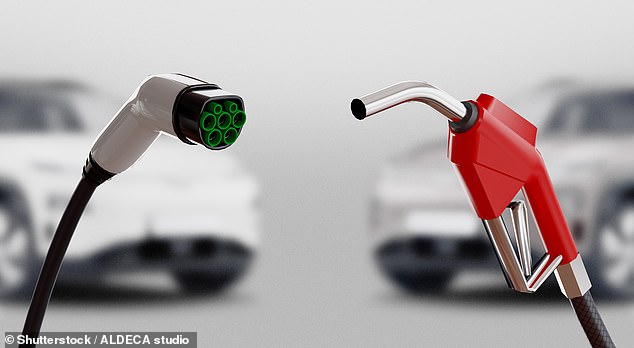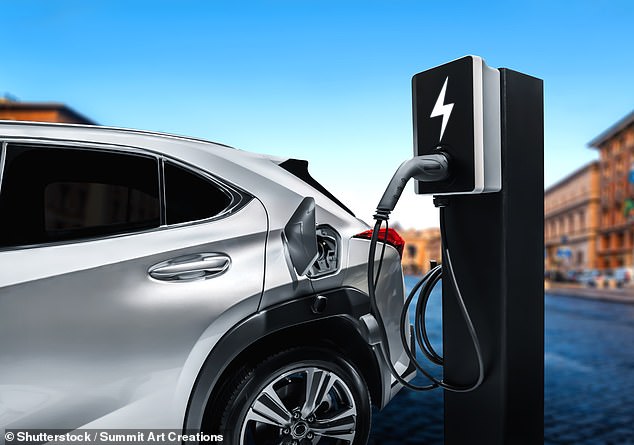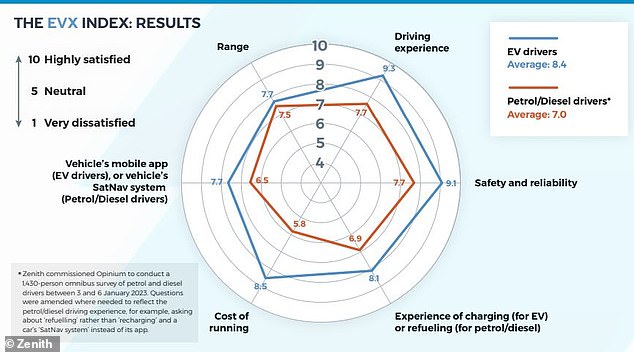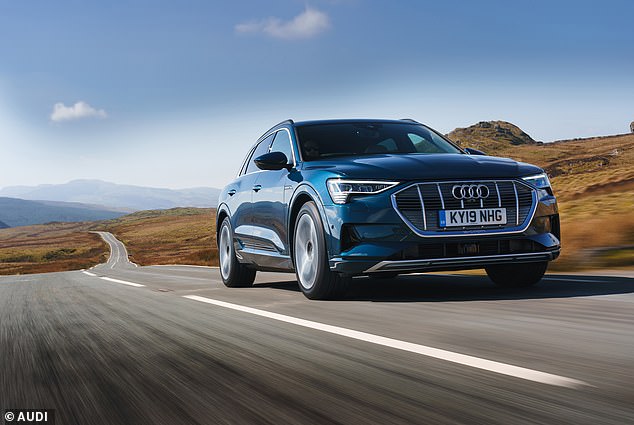Most electric vehicle drivers will not use their battery-powered cars for longer journeys, and half have a petrol or diesel model as a backup for when they need to complete longer distance journeys, a survey suggests.
Owners are not comfortable relying on their electric cars or the charging network when making trips of more than 60 miles, the survey of 2,800 electric vehicle users by leasing company Zenith revealed.
Less than one in five of the UK-based panel of EV drivers said they use them for longer journeys.
And its alternative of having a second car powered by a combustion engine “could be slowing the transition to electric vehicles,” according to the report.

EV owners can’t fully rely on their battery-powered cars for longer trips: Half of EV owners have a second gasoline or diesel vehicle at home that they use for longer trips
Official figures show the one millionth electric vehicle hit British roads in January, as the take-up of battery-powered cars continued to rise.
However, electric car purchases by private buyers on a year-on-year basis fell by a quarter (25.1 percent) last month as declining consumer demand persisted.
Instead, it is fleet registrations that are underpinning EV sales statistics in Britain, boosted by low company car tax rates of just 2 per cent and the availability of salary sacrifice schemes through employers.
Zenith’s new report shows that 51 percent of those who have switched to electric vehicles (now representing more than 500,000 drivers) still have a second gasoline or diesel-powered vehicle under the hood.
The vast majority (73 percent) of these people with a two-car garage made up of an electric vehicle and a combustion engine car said they have no plans to ditch the latter to go fully electric anytime soon.
As such, the leasing company said the UK’s “two-car family” could slow the wider transition to battery-powered vehicles, as many appear keen to retain their petrol and diesel engines as a backup.
Half of electric vehicle customers told the leasing provider that they drive their plug-in vehicles only for short trips of up to 30 miles, while only 18 percent use them for longer trips, defined by Zenith as those over 60 miles. miles.
A quarter of EV users said they “don’t feel safe” taking longer trips in these cars, with the most common reasons cited being unreliable public charging (36 percent) and range anxiety ( 34 percent).
In fact, limited range was the main concern of EV drivers: a quarter felt that their vehicle’s actual range was worse than they expected and what the manufacturers’ “official” figures had promised, and a similar proportion (24 percent) highlighting how the charging experience did not live up to the standards they expected.
That said, the study also revealed that 86 percent of those who have switched to an electric vehicle would not return exclusively to gasoline or diesel ones, while the vast majority (86 percent) are confident that charging infrastructure will improve in the next three years, increasing the likelihood that they will take longer trips in an electric car in the future.


The leasing firm says the UK’s “two-car family” could slow the wider transition to battery-powered vehicles, as many appear keen to retain a petrol or diesel engine as a backup.


Range and charging experience are two of the biggest problems for electric vehicle drivers, according to Zenith report
EV drivers want big SUVs and are turning away from Tesla
Another important finding from the Zenith study is that large SUVs are increasingly popular among electric car buyers.
Of the 26 different models owned by respondents, the Kia e-Niro/Niro EV and the Audi E-tron were among the five most common.
This is likely because these types of vehicles have larger batteries, which in turn means greater range on a single charge.


Zenith’s report found there is a huge appetite in the UK for SUV-style electric vehicles (like the Audi e-tron pictured), rather than motorists opting for smaller models. This is likely because their batteries are larger and therefore have a longer range on a single charge.
The survey also found that while Tesla remains the overall preferred brand, there has been a decline in the number of drivers choosing Tesla vehicles.
This suggests a growing willingness among drivers to explore different brands, reflecting the growing range of electric vehicle options available.
Tim Buchan, chief executive of Zenith, said: “Since our first EVX report in February 2023, we have seen a five-year delay to the 2030 deadline, failure to meet ultra-fast charging targets on motorways and increased misinformation. about driving electric vehicles.experience.
“It is not surprising that the latest generation of EV drivers comes to the world of EVs with less confidence than the first generation of users.
“It’s clear from our research that there is still anxiety about traveling longer distances, so while it’s great to see so many drivers starting their EV journey with larger SUV models, typically ‘family’ cars, there remains a reluctance.” to become a fully electric home.
“We know that electric vehicles are the future of mobility, so we hope that more work will be done to provide certainty, starting with the government confirming its commitment to net zero emissions with measures to help drivers make the transition, and additional investments in our charging infrastructure, so that it has a chance to catch up with consumer needs.
VIDEO
![]()
VIDEOS OF ELECTRIC CARS
Some links in this article may be affiliate links. If you click on them, we may earn a small commission. That helps us fund This Is Money and keep it free to use. We do not write articles to promote products. We do not allow any commercial relationship to affect our editorial independence.
